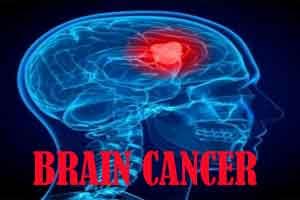- Home
- Editorial
- News
- Practice Guidelines
- Anesthesiology Guidelines
- Cancer Guidelines
- Cardiac Sciences Guidelines
- Critical Care Guidelines
- Dentistry Guidelines
- Dermatology Guidelines
- Diabetes and Endo Guidelines
- Diagnostics Guidelines
- ENT Guidelines
- Featured Practice Guidelines
- Gastroenterology Guidelines
- Geriatrics Guidelines
- Medicine Guidelines
- Nephrology Guidelines
- Neurosciences Guidelines
- Obs and Gynae Guidelines
- Ophthalmology Guidelines
- Orthopaedics Guidelines
- Paediatrics Guidelines
- Psychiatry Guidelines
- Pulmonology Guidelines
- Radiology Guidelines
- Surgery Guidelines
- Urology Guidelines
Brain cancer can now be detected five years earlier in blood: Study

American researchers have found that changes in immune activity can be indicative of a growing brain tumor five years before the symptoms actually surface.
Interactions among proteins that relay information from one immune cell to another are weakened in the blood of brain cancer patients within five years before the cancer is diagnosed, said lead researcher Judith Schwartzbaum from the Ohio State University.
The study, published in the journal PLOS ONE, focused on gliomas, which make up about 80 percent of brain cancer diagnoses. Average survival time for the most common type of glioma is 14 months.
Symptoms vary and include headaches, memory loss, personality changes, blurred vision and difficulty in speaking. On average, the cancer is diagnosed three months after the onset of symptoms and when tumors are typically advanced.
"It's important to identify the early stages of tumor development if we hope to intervene more effectively," Schwartzbaum said.
This research could pave the way for techniques to identify brain cancer earlier and allow for more-effective treatment, Schwartzbaum said.
The researchers evaluated blood samples from 974 people, half of whom went on to receive a brain-cancer diagnosis in the years after their blood was drawn.
They evaluated 277 cytokines in the blood samples and found less cytokine interaction in the blood of people who developed cancer.
"There was a clear weakening of those interactions in the group who developed brain cancer and it's possible this plays a role in tumor growth and development," Schwartzbaum stated.
Cytokine activity in cancer is especially important to understand because it can play a good-guy role in terms of fighting tumor development, but it also can play a villain and support a tumor by suppressing the immune system, she said.
In addition to discovering the weakening of cytokine interactions in the blood of future cancer patients, the researchers found a handful of cytokines that appear to play an especially important role in glioma development.
"It's possible this could also happen with other tumors - that this is a general sign of tumor development," she noted.

Disclaimer: This site is primarily intended for healthcare professionals. Any content/information on this website does not replace the advice of medical and/or health professionals and should not be construed as medical/diagnostic advice/endorsement or prescription. Use of this site is subject to our terms of use, privacy policy, advertisement policy. © 2020 Minerva Medical Treatment Pvt Ltd